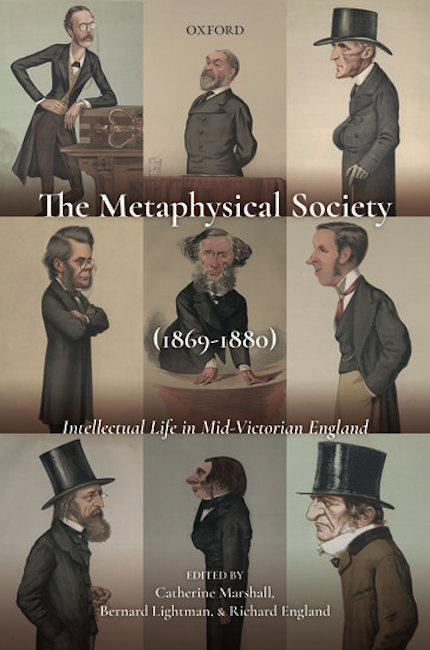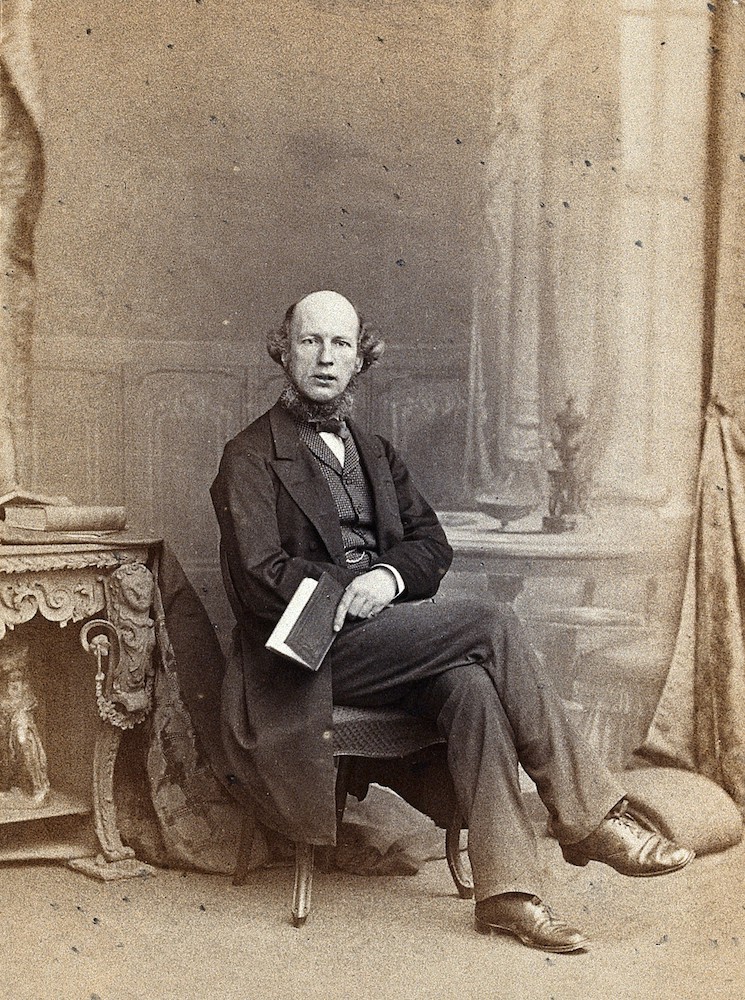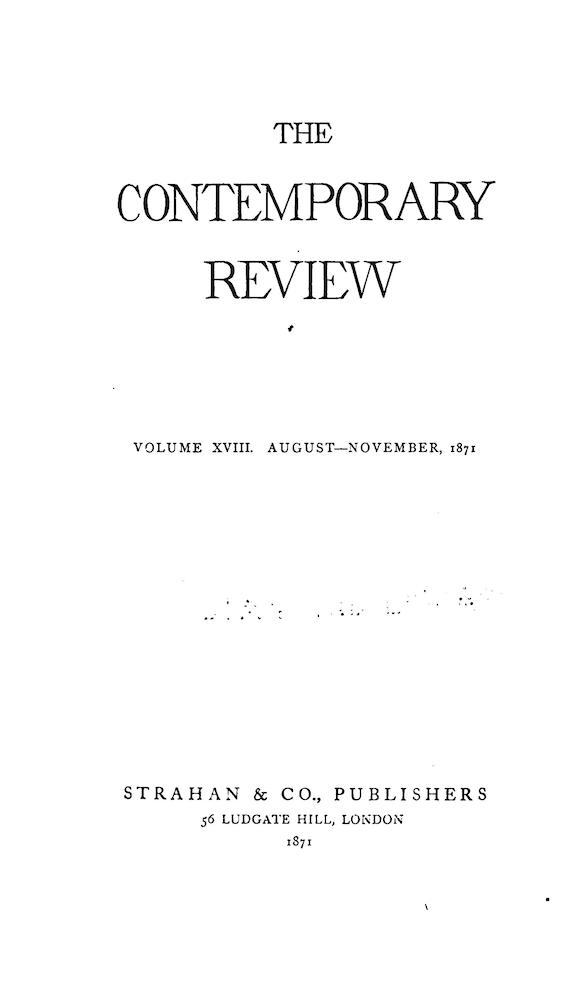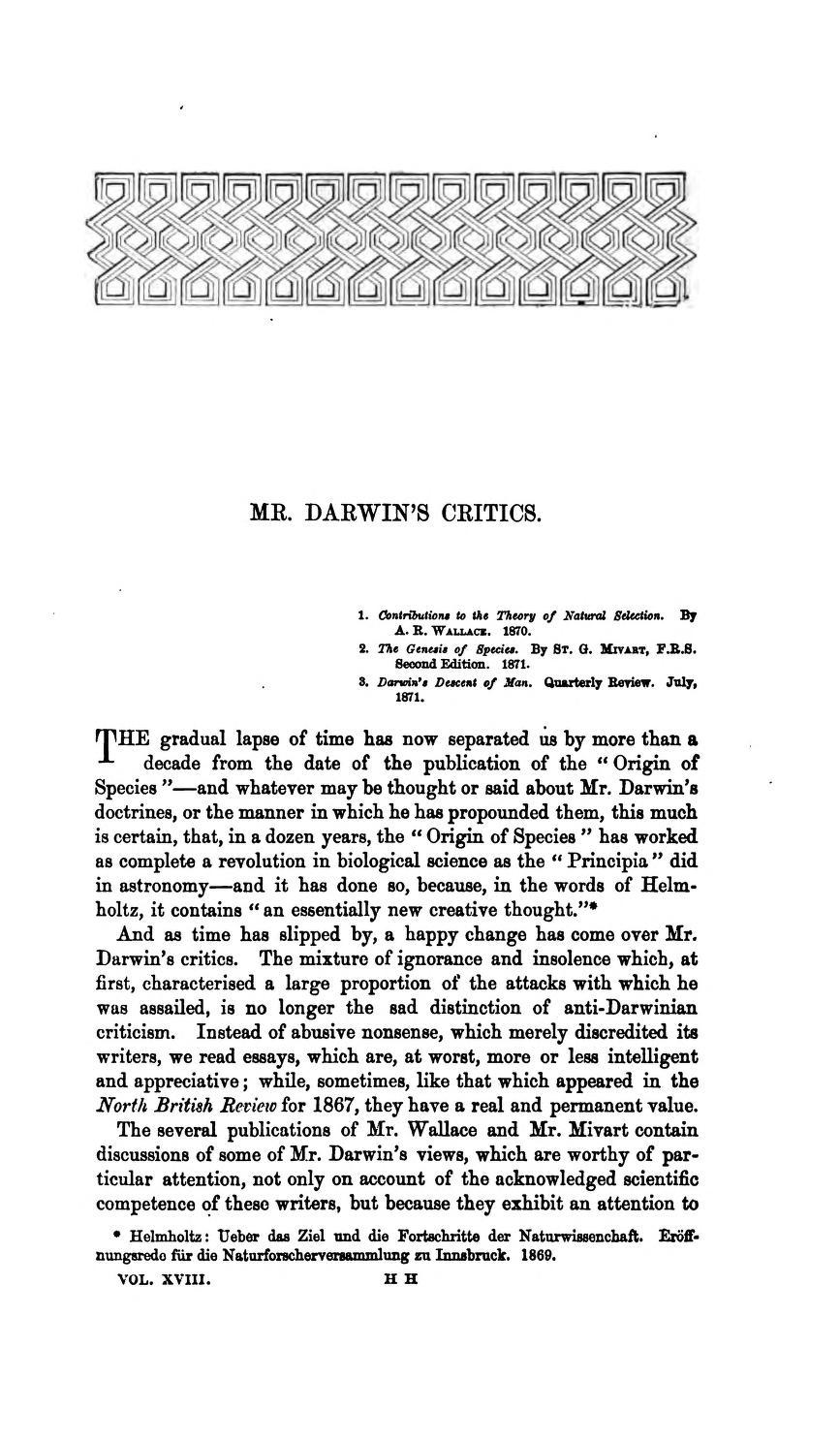This review is reproduced here by kind permission of Professor Mandler and the online inter-disciplinary journal Cercles, where it was first published. The original text is available here. It has been reformatted and illustrated for the Victorian Web, with the addition of links and captions. Click on the images to enlarge them. — JB

The re-discovery by Richard England of the lost minute book of the Metaphysical Society has led to a surge of publication on the Society, culminating in a three-volume critical edition of the 95 papers given at the Society's meetings across the 1870s and now this collection of scholarly essays. It is no longer the case that the Society is viewed, as it may have been in A.W. Brown's 1947 monographic treatment, as some kind of executive committee of Victorian liberalism. Although these theologians, scientists, philosophers and political theorists no doubt set themselves up as, in Paul White's words, 'joint authorities of culture, our understandings of culture and liberalism are both now too capacious to be so easily hegemonized by a small group of scribblers, however elevated.
Nor can we assume any longer — as Brown might have done — that the Society proved the crucial battlefield in the war between science and religion. It's partly that we know better how many such battlefields there were, with non-elite as well as elite actors. But it's partly also that we know better now that such a battle is never won outright by any party, still less at one time. As the essays in this volume amply demonstrate, though the Society was created for the discussion – and presumably resolution – of the major epistemological questions raised by conflicts between science and religion, it never met its founders' highest expectations; in any case, no such resolution was possible or even desired. Not many of the participants had appetite for a fight. Even T.H. Huxley, not shy of fights, went out of his way to praise Christ's moral perfection in his January 1876 paper, as Gowan Dawson points out. Fitzjames Stephen proved rather exceptional in tilting head-on at the Catholics present, as Bruce Kinzer shows. But the mainstream position in the Society, or at least the balancing point between Huxley and Stephen on the one hand and the Catholics on the other, was a decidedly theistic one adopted by Unitarians like W.B. Carpenter. And here we can see the emergence of what Stephen Jay Gould called the consensus of 'non-overlapping magisteria' – the Unitarians' conviction that science and religion could not conflict – led to a wider acceptance that practically speaking they just didn't. This may have required more ceding of ground by the pious than by the impious, but it proved mutually convenient. But it also rendered the Metaphysical Society's purpose moot. Why argue?, was many participants' ultimate conclusion.

One of the Society's 'authorities': the Unitarian physician and biologist William Benjamin Carpenter (1813-1885), photographed by Ernest Edwards in 1868. [Credit: Wellcome Collection, on the Creative Commons attribution — CC BY 4.0 licence.]
While this conclusion may have truncated the Society's life, it does not vitiate its significance. The essays in this volume do an excellent job of inserting the Society into a wealth of relevant contexts in late Victorian intellectual and cultural life. Debates within Catholicism, ethics, and evolutionary science are all covered. The histories of journalism and the book are highlighted, naturally because many of the Society's impresarios were cultural mediators and so many of its papers ended up in published form in influential journals edited by members, almost a third of them in the Contemporary Review, carefully tracked by Catherine Marshall. But the real significance of the Society, it seems to me, lies somewhat paradoxically in the way it points to the eclipse of journals like the Contemporary, which had assumed that its readers and writers were the 'joint authorities of culture', and indeed of all human thought. For the work the Society did in ushering in the 'non-overlapping magisteria' was one factor in persuading some of its key contributors that they would make more progress speaking to narrower groups of specialists than trying to engineer an impossible consensus among too diverse a body of thinkers.



Left to right: (a) Title page of the Contemporary Review, Vol. XVIII (Aug.-Nov. 1871), from a copy in the Internet Archive. (b) Detail of a seated sculpture of T. H. Huxley, by Edward Onslow Ford, at the Natural History Museum, London. (c) The opening of T. H. Huxley's review, 'Darwin and His Critics', in the November 1871 issue of the Contemporary (443-476).
In particular, the short life of the Society gave a major impetus to more specialist publication in – and thus the professionalization of – philosophy. Philosophers at the Society expressed impatience at having to waste time on the relatively trivial or unrevealing question of the reliability of the Apostles' testimony on miracles or the crucifixion. There were surely better and more generalizable ways of discussing belief and evidence and knowability. Kant seemed a better guide to understanding the relation of intuition and experience than Aquinas. As Anne DeWitt shows in her chapter, many participants again concluded that rather than seeking 'a common (high) ground ... a shared intellectual calling and moral intuition' (Paul White's words again, quoted at 160), it was easier and more productive to fall back on multiple distinct communities of expertise. For these purposes philosophers like Shadworth Hodgson and W.K. Clifford needed to separate themselves from both the scientists and the theologians. It began to make more sense to them to publish in the Proceedings of the Aristotelian Society than in the Contemporary or the Fortnightly. And as W. J. Mander shows in his chapter, their successors amongst the British Idealists were more 'successful' as philosophers in conceptualizing the relation between science and religion, both intellectually and also ironically in their wider cultural influence, precisely because they were mostly full-time 'university men' and not polished amateurs. Perhaps the Metaphysicals revealed more about themselves in their death than in their life — but that may be too metaphysical a note to end a review of a meticulous and thoughtful volume of essays.
Bibliography
Marshall, Catherine, Bernard Lightman and Richard England, eds. The Metaphysical Society (1869-1880): Intellectual Life in Mid-Victorian England. Oxford: University Press, 2019. Hardcover. xii + 282 pp. ISBN 978-0198846499. £70.
Created 22 March 2020